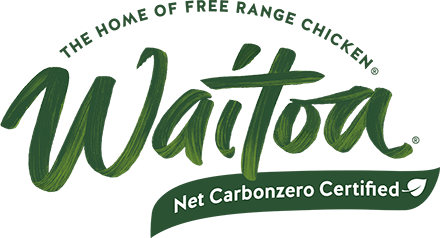These chickens are carbon-zero
The phrase "carbon-zero" is not something usually associated with chickens.
But, after a year of hard graft, Waitoa Free Range Chicken, can now boast the title of New Zealand's only independently certified producer of net carbon-zero chickens.
"It's taken a long time to get here, and it's something we are really excited about," says Jonathan Gray, Chief Executive.
When they began 14 years ago, Gray says Waitoa were trailblazers in the free-range chicken market, awarded SPCA accreditation for their animal welfare practices in 2013 and well-known for their focus on the natural environment and animal welfare.
The Toitū net carbon zero certification was awarded after a stringent process involving measuring the carbon footprint at every step of the supply chain – from raw materials and production, through to distribution and packaging. There are exacting requirements (which led to a huge workload for those involved) as the certification is internationally recognised.
Other companies and organisations who've completed the certification (and reduced their carbon footprint significantly in the process) include Auckland District Health Board, University of Canterbury and Freightways.
In addition to the obvious environmental benefits, Toitū carbon-zero certification also allows consumers to be confident that the rating isn't just "greenwash".
"The independence of the Toitū certification speaks to the truth of the claims, which is incredibly important for consumers," says Gray.
To qualify for the Toitū certification, Waitoa had to show plans for reducing emissions across the supply chain and measure progress. Emissions from raw materials, manufacturing, distribution, packaging, and disposal were factored in, with Waitoa measuring and reporting on annual carbon footprint reductions.
Waitoa also partnered with Toitū-approved local projects in Marlborough and offshore to offset unavoidable carbon emissions to achieve net carbon-zero emissions.
Innovation is key when it comes to creating sustainable solutions and Gray says Waitoa thought outside the box to put in place solutions good for both the business and the environment.
"One of our areas of focus was our water use and what we did with our water," he says. "Waitoa (where the brand is based) is located near Te Aroha and we had been reliant on the municipal water from there.
"So, a few years ago, we invested in a bore, which allows for contingency and removed a level of risk from the business."
But there was a problem: the bore water was thermally heated and came out of the ground at a balmy 30°C.
"That was both a challenge and an opportunity," says Gray. "We ended up installing a heat recovery system, which transfers the heat from the incoming water into our hot water supply, thereby reducing energy requirements."
Another initiative involved researching alternative feed sources, for example, minimising the need for soy-based feed, a product associated with deforestation.
Packaging is a perennial issue for those in the food industry, with disposal placing significant stress on the environment. Gray says Waitoa Free Range Chicken has made huge investment in this area, putting in place targets to ensure they tread more lightly when it comes to packaging.
"Plastics are heavily used in food safety – but we have put targets in place and are moving to having 100 per cent reusable, recyclable, and compostable packaging by 2025. We currently sit at 90 per cent."
Waitoa is also aiming to have their packaging contain 50 per cent recycled materials by 2025, currently sitting at 30 per cent.
"We are also moving to rPET meat trays, which are made in New Zealand using at least 60 per cent recycled materials."
Waitoa Free Range is committed to science-based targets on greenhouse gas emissions, Gray adds. That aligns to the UN 2015 Paris Agreement, as well as water use and landfill waste reduction targets. All the measures put in place so far have improved year-on-year and more than 90 per cent of solid waste generated from operations is diverted from landfill.
Gray says the Toitū carbon zero certification aligns perfectly with Waitoa's over-arching strategy and commitment to doing good for the community, environment and business – and adds that poultry comes from a good starting point when it comes to carbon footprint.
"It has the lowest carbon footprint of land-based meat sources and we have a commitment to keep reducing this further.
"We take an evidence-based approach to reducing our footprint leading in reducing carbon emissions, water stewardship and sustainable agriculture and production. Our strategy is about doing good for our people, community, environment and business so we can leave both the business and the environment in a good place for the next generation."
